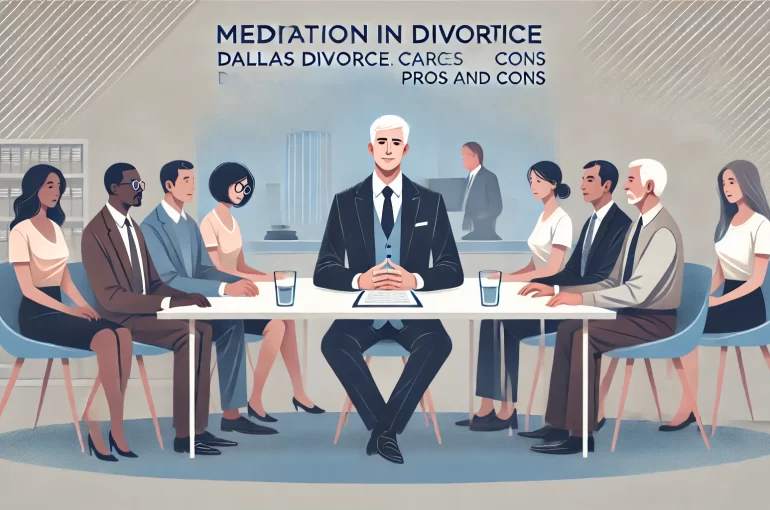The Role of Mediation in Dallas Divorce Cases: Pros and Cons
Divorce is a challenging process, emotionally and legally. In Dallas, as in many other jurisdictions, mediation has become an increasingly popular method to navigate the complexities of divorce. Mediation is a process where a neutral third party helps the divorcing spouses reach an agreement on various issues out of court. This blog explores the advantages and disadvantages of using mediation in divorce proceedings in Dallas.
What is Mediation?
Mediation is a form of alternative dispute resolution (ADR) that aims to help parties find a mutual agreement by facilitating negotiations. It involves a trained mediator who does not make decisions but helps guide the parties toward a mutually acceptable settlement. In the context of divorce, mediation can cover topics such as asset division, child custody, and spousal support.
Pros of Mediation in Divorce Cases
- Cost-Effectiveness: Mediation is generally less expensive than a court trial or series of hearings. This is because the process is quicker and less formal, and it reduces the amount of billable hours charged by attorneys.
- Confidentiality: Unlike court proceedings, which are public, mediation remains a private process. This can be especially valuable in divorce cases, where preserving privacy is often desired.
- Control: Mediation gives both parties more control over the outcome. Unlike a judge, the mediator does not dictate the terms but helps the parties come to an agreement on their own terms.
- Speed: Because it avoids the back-and-forth of courtroom proceedings, mediation can be much faster, helping both parties move on sooner.
- Emotional Ease: Mediation can be less adversarial and confrontational than traditional divorce litigation, which can help reduce the emotional stress involved.
Cons of Mediation in Divorce Cases
- Imbalance of Power: If one party is more dominant or persuasive, they might influence the outcome unduly, especially if the other party is more passive or less articulate.
- Lack of Legal Protection: Because mediators cannot offer legal advice, parties without legal representation might enter into agreements without fully understanding their legal implications.
- Potential for Non-Compliance: Agreements made in mediation are not guaranteed to be enforceable. If one party does not adhere to the agreement, legal intervention may become necessary.
- Not Suitable for All Cases: In cases involving hidden assets or domestic violence, mediation might not be appropriate as it relies on open communication and trust.
Conclusion
Mediation can be a powerful tool for many couples going through a divorce in Dallas. However, it’s not suitable for everyone. Understanding the pros and cons can help you decide if mediation is the right path for your situation. For more detailed information on mediation and other divorce-related issues, visit Engel Law Group’s divorce page.


Buy 100 Proxies
Sep 9, 2024, 11:48 pmExcellent blog you have here but I was curious about if you knew of any community forums that cover the same topics talked about here? I’d really love to be a part of group where I can get feed-back from other experienced individuals that share the same interest. If you have any suggestions, please let me know. Thanks a lot!
100 Private Proxies
Sep 9, 2024, 3:49 amHey there! I just wanted to ask if you ever have any problems with hackers? My last blog (wordpress) was hacked and I ended up losing many months of hard work due to no data backup. Do you have any methods to prevent hackers?
Tyson Buck
Sep 9, 2024, 12:28 pmyes we have. You can connect with our IT management company imwebpros.com
Buy Private Proxies
Dec 12, 2024, 4:54 pmThat is really fascinating, You’re an excessively skilled blogger. I’ve joined your feed and look ahead to seeking more of your fantastic post. Also, I have shared your site in my social networks!
Private Proxies For Sale
Dec 12, 2024, 9:52 amUsually I don’t read post on blogs, but I wish to say that this write-up very forced me to try and do so! Your writing style has been amazed me. Thanks, quite nice article.